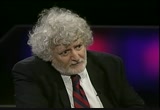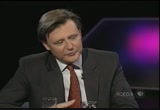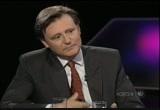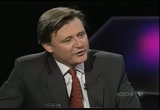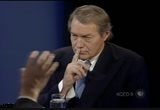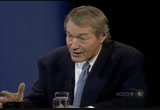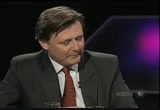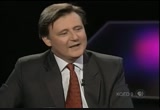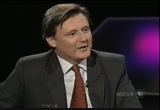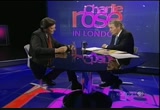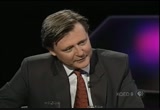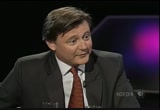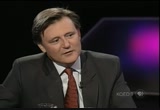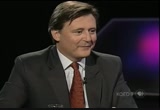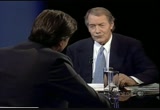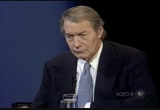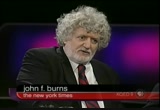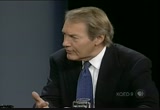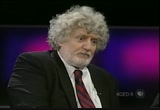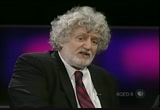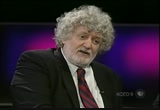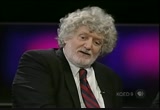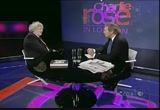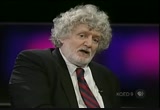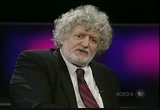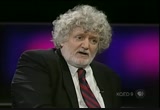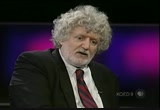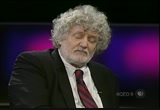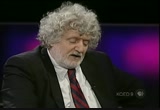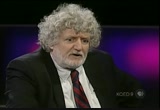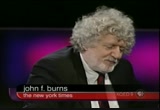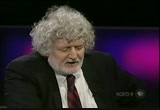tv Charlie Rose PBS September 9, 2010 11:00am-11:41am PST
12:00 pm
>> rose: from london, the editor of the "economist," john micklethwait. >> in some way he's been a convenient scapegoat. a lot of people supported the iraq war, it wasn't just him, it wasn't his silk-tongued rhetoric which dragged us into it. a lot of people thought it was a good idea and yet now conveniently within britain and many other countries it's blamed on this george bush and his cleverred-tonged mood until tony blair. think think he wants to say, no i was a bigger figure than that. >> rose: also from london, an old friend of this program, john burns now the london bureau chief of the "new york times". >> we were perhaps transfixed by the relief would come to iraq with the overthrowing of saddam
12:01 pm
and yes maybe we should have spent more time difficult as it would have been under saddam to look at the trauma, the psychological trauma inflicted on iraq by the ba'ath party and saddam over a period of 30 years. all of that it can accept. if i had to do it over again i would have looked at that because it was the fractured pitch thatter that society in part along with saddam terror overground as government going underground as an insurgency that made the american venture in iraq next to impossible to achieve. >> couric: from london john and john when we come back.
12:02 pm
12:03 pm
"economist" magazine. i'm pleased to have him back on this program to talk about tony blair and david cameron and europe and many other issues, welcome. >> thank you for having me again. >> rose: tony blair. put in the perspective what you think he is about now, how you think britain will respond to this book which seems to be selling very well. >> i think it's very interesting. the last two times before the book one thought of blair was he reappeared during the election and he seemed a very strange distant figure then and also during the iraq inquiry he appeared and a lot of people reacted badly to him. >> rose: the chill cot inquiry. >> people thought he didn't show enough sympathy for the victims. what was interesting is this politician still has the ability to connect with people. if people are buying this book... before people were worried that peter manlson's book was the third man and that would displace a need for blair's book and some people say
12:04 pm
people around blair were worried about that but he has this ability to communicate. >> rose: how is he viewed today here? >> very different from how he was viewed from two or three years ago. i think he realized he began to look very distant and far away and the book seems to be written in the much more cleche weal style. this longer this transatlantic businessman he seems to become. i think he's still... like all good politicians his tragedy is the moment when you realize the people no longer love you. you're so good at understanding what people think about you. your job is knowing what people want. the whole problem with blare is somebody who got him into a bad situation. >> rose: could bit the first step in terms of a return to britain in terms of a since that as long as you understand why i
12:05 pm
did what i did, allow me to explain to you why i did that he think there is can be some greater appreciation that it was principled for him? >> personally i think there is more room to sympathize with him but i don't get the that feeling from the rest of the country. a lot of people supported the iraq war, it wasn't just him. it wasn't just his silk-tongued rhetoric which dragged us into it. a lot of people thought it was a good idea now conveniently within britain and many other countries it's blamed on this george bush and his clever-tongued poodle, so to speak, in tony blair. and i think they he wants to sao i was a bigger figure than that. >> rose: he's right and his critics are wrong? >> i think he's right to think he's a bigger figure than that. he's one of the most impression politicians arguably alongside bill clinton the person most able to persuade people to do things. also he wants to justify... i
12:06 pm
think he thinks he wasn't as transformative as thatcher. wasn't as transformative as reagan. he had all these talents, he didn't achieve quite as much. i think he regrets not having changed britain as much as he maybe wanted to. so it's a chance for him to have his say but underneath it i think there's a man who like all these things britain doesn't tend to be as keen on redemption as america is. america loves a sinner who's come back. >> rose: but it's doable do you think or does it take a longer time beyond blair? >> i think it's going to take longer. in some ways unfairly. he's become such a convenient scapegoat but he's begun to readjust that. >> rose: there's a sense among the people i've talked to-- and these are not pundits or people who run magazine-- these are regular people who say "he misled us into a war that he believed was right but he misled us." >> i think that's part of the thing blair is trying to get across. i think it's true.
12:07 pm
we once had a cover calling him a sincere deceiver. i think he passionate natalie believed it to such an extent that he was able to accommodate at best half-truths to get it through and you're right. because there is that element and there's an element of toxicity about the blair brand which i don't think you can share. you can solve immediately. i do think the toxicity-- speaking personally-- is overdone. >> rose: is the toxicity the reason he didn't get to be president of the european union? >> no, i think that has more to do with the fact that whatever else he's a big figure. i think he was too big for angela merkel. >> rose: angela merkel didn't want to see someone that big with that large a personality? >> i think europe had... the conventional reason to get rid of blair they didn't want somebody with iraq, all those problems. they wanted to go to someone small who the main leaders of europe could control. now the tragedy of europe is look, we have van rampy who is not someone who's likely to be transferred next door to hu
12:08 pm
jintao and barack obama. so the chance of having a bigger figure on the world stage went by. >> rose: is there a future public role for him? he talks about public service. >> i think the bit which blair has become fascinated by, religion but i think particularly the middle east. without sounding too spiritual about it, blair's redemption always for iraq... one forgets particularly in america he went on and on and on about israel and palestine. he's always seen those two things together. >> rose: in fact, that's one thing he seemed to have some differences with george bush. he pushed bush to do more. >> that which he always thinks he was let down on. he thought he expected to get something back there and he's seen it as part of the same process. it's not... he's certainly not an anti-israel figure and doesn't dpol low conventional european things. he's more pro-israel than a lot of europeans are.
12:09 pm
he is somebody who believes passionatefully the two-state solution. >> tell me what you think he feels deeply about? he talked to me about this last night, this idea of the global jihad. the notion that there is a need for transformation within islam. >> i think what was interesting about what he said to you which i think he went further than he's gone before is saying not just that islam has a problem with a few extremist bus more generally the whole thing needs a reformation. it needs to go through the same processor world religions has gone to. he's clever enough once again not to use it. but once you start talking about people within islam beginning to speak up, to change it, that's... it's that type of thing. and he has got a point to the extent that he's right. there is a narrative which has grown up within islam of oppression, of the west being
12:10 pm
responsible for its many ills. and some of that is correct but a lot of it isn't and that's what i think he's trying to deal with. >> rose: he believed that saddam had to be taken down, whether he had weapons of mass destruction or whether he maintained the potential to do it because of plans and... he also believed that if iran has nuclear weapons there's a possibility they'll fall into the hands of people who will use them. not iranians but whoever else. and that therefore you can not allow it. and he's prepared to say that if sanctions and diplomacy and everything else doesn't work then you have to have a military attack. >> again, i think he's coming out of his closet-- if i can put it that way-- more. he's saying things more directly than he would do in office. but i think blair again has always had this deep abiding worry about nuclear weapons. about what people could do with them. and the history is very clear, this predates george bush by a
12:11 pm
very, very long way. it's something he was badgering bill clinton about. it's part of him. give him some credit. he's not actually meandering. he's not pandering to people. these are not popular things to say. nobody on this side of the lat lann tick is gunning to go for iraq. >> if you look at the chicago speech and then look at 9/11 which had a real impact on him it's a direct line to an invasion of iraq for him. >> there was a continuation there. blair had a much... he approached in that world after 9/11 you look back at it. you can argue two groups of people, both of them now much ridiculed where the people who had the clearest sort of world vision on it. one was the near conservatives who had this narrative if you will. blair slightly... >> rose: dick cheney and others. >> they had... there was this idea which blair had about this was something very important and he was right in there and he also had that instinctive desire to stick by america, which i
12:12 pm
think makes a big difference. and that's... the problem for blair in some ways is the consequences of all these things. amazingly bright, clever, articulate supreme politician is many of the things he loved most in the world-- like the desire to push middle east peace, like weirdly the european union-- he came in as one of the most pro-europe prime ministers ever. the idea of having a foreign policy which was about more than just money. he wanted to really establish goodness as he saw it. all those things. in some ways by the time he left it had all gone backwards and so it's that curse of politics all political careers end in failure >> rose: your magazine has generally been supportive of tony blair. >> we supported tony blair in not his first election but the other ones afterwards. to be honest, he built up this new version of the labour party. again, somewhat ridiculed now but the concept of new labour was a good one, i think.
12:13 pm
the concept was we're not on about the class war, we don't think it's wrong for people to make money. what we do want to do is take thatcherrism and we want to take off some of the rougher edges of it. as he points out, he did win a lot of elections as a result. >> rose: he says that when you talk about it. i'm not sure he appreciates the depth of the kind of complaint about iraq but he... >> i think that's true. i think it's an element whereby he's somewhat... his life is insulated from that. he does... he hears a bit from there. the sheer anger and fury, blair amongst the british middle-classes and beyond is very deep... >> rose: it hasn't disappeared. >> and it's not just predictable people. people feel really strongly and bitterly about it sphoovment up his self-image is what? do you think? how does he see himself? >> i think he sees himself as so n some ways wronged. he sees himself as a guy who
12:14 pm
tried to do the right thing. >> rose: tried to do what principle told them to do not... >> it's a very unpopular thing. >> he saw principle in iraq, he saw principle in... >> rose: kosovo. >> exactly, kosovo. he was haunted by previous examples of people not going to rescue things, not going to sort things out and he thought that was... he wants to rewrite that. he wants also i think to rewrite this idea that there's something cringey and just about spin about new labour. a tiny bit like b.c., that it was all just clever p.r . >> rose: it had to be do with the balance of the state and private sector. >> he's begun to think about that. that's something which he i think coming into office he came to too late. >> rose: that brings me to this. radical britain, you say, the west's most daring government. >> i think it is. i think there's an interesting point. you could argue-- this is being somewhat provocative-- you could argue britain is more interesting than it has been... and this is a slight indictment of tony blair. more interesting in any other time since margaret thatcher
12:15 pm
because you now suddenly have a government doing massively radical things in the same way as margaret thatcher was doing. >> rose: but things are called austerity. >> it's austerity but it's also about... look around the world. the big challenge at the moment is... two big challenges. one is what to do about capitalism and the other is what to do about the state. well, the people, strangely, who are thinking the biggest thoughts about that are back in britain. and this is not a parochial point of view, it came as a slight surprise to me when i actually thought about it. but you look... barack obama has not produced any plans about trying to redivide... work out what the state's fall in. but in terms of where... if you want to look at radical ideas about what to do about the state or radical ideas in terms of deficit cutting, you're suddenly looking at britain. and i think britain is interesting in that way. >> rose: what what are the radical ideas? >> i this i the radical... there are two, partly just the savagery that they're doing, they're cutting on a scale unlike any other government.
12:16 pm
cutting 20% out of most departments. that's a lot to take out. they've exempted health. and that's going to be enormously difficult. >> rose: and as you say in the united states, the cutting is not just fat, they're cutting to the muscle. >> they're cutting it back in a big way. secondly, there is a sort of beginnings of a... there is this big intellectual problem which we've wrestled with, endless people wrestled with and you can see the republican right which is generally in the source of ideas on this, has not really, i think, got on with it. all it's got is fury. but the basic idea is this. the dealing with the state cannot just be about reducing the supply of it, getting rid of departments. people want... why people want big government everywhere, because people want it. and it's not just the left, it's the right as well. both people... the right builds prisons, the left builds hospitals. neither of them are doing much about it. >> rose: and they both build armies. >> you have to start making people think about... so all these ideas cameron has about devolving power down towards people, that i think, is a
12:17 pm
radical solution. >> rose: how does that work, the devolving of power down to people? >> i think they're pushing stuff down in terms of... trying to hand schools over to people to run them, they're get make yours to be locally elected, they're getting police chiefs to be locally elected. again and again they're trying to tell people if you have a problem, don't automatically turn to the state for the answer. >> rose: because the state can't afford to do it anymore? >> and also just potentially the sate isn't the right person to do it because the state does it, you create an atmosphere of... >> rose: is this because we're facing the kind of deficits that we're facing around the world? the debt explosion that is there mean that this is, in fact, the forerunner of where government is going? >> i think it's... >> rose: even in france. >> you notice we call it the world's most daring government. there are bits where we think they're going down the wrong path and they've made some odd decision bus actually, yes, they are. some of it is just britain messed up. they inherited a fiscal deficit which is much worse than other people.
12:18 pm
america can get away with having its deficit for a bit longer. but sooner or later america is going to have to face this. you look at the midterms. this is the great unacknowledged question. obama has not come up with any kind of sensible medium-term plan to bring down the deficit. and to be honest, the republicans haven't either. they've made a half effort. they're sitting there and saying "we have to cut taxes. requests that's not a realistic way to do it. it's got to be something bigger an cleverer than that. it may be that part of it here they've had to raise taxes as well just to try and balance things. america's got to do... at some time has to deal with entitlements. >> rose: tell me where you think france is and where the sarkozy government is. >> sarkozy is a great disappointment. we endorsed sarkozy and sarkozy very much said "here i am, i'm not the normal french president, i'm not the norman an ark, i'm this person who's going to take on things, upset things. " and what's happened is one thing which perhaps people like
12:19 pm
me should have been more careful about being nice about him, he's always been something of a corporatist. he's always wanted to run things from the state to some extent. >> rose: he wanted to run things and because he was head of government he wanted to run things from where he was. >> and time and time again he's compromised. he came out with ideas about the universities. today there's a general strike in france because of raising the pension age to i think it's 62. this is not by any measure... france used to have a pension age of 65, 70 or something like that. it's... this is not a man who is seeming to be radical. and that, again, is the interesting thing about... here is cameron, in english phrases the tough establishment figure with clegg... >> rose: education.. >> forced into a coalition who looked weak, who certainly didn't seem as if he was necessarily going to be as radical as this and you have sarkozy, a much more napoleonic figure in every way and you could say obama as well. obama came in with all that hope
12:20 pm
and ideas and so on but actually strangely out of nowhere... >> rose: across the atlantic what do you make of the declining poll ratings for senator barack obama. >> i think a lot of it would be predictable on the basis of the economy. >> rose: and the level of expectations? >> and the level of expectations. i think he's... it's too early to say if he's in real trouble. you have to wait to the mid-terms but i do think that it was a very difficult thing to take on. he hasn't, though, i think from just sticking on the economy and moving on to foreign policy if you want, on the economy it would have been help to feel have spelled out some kind of medium-turn plan about how we'll take this down. he's sometimes again, obama, run away from tough issues on the whole. i used the example of b.p. that was a chance to talk to america honestly about energy. he never really did until it was too late and by then... >> rose: he made a speech in pittsburgh. >> exactly. that was... >> rose: the follow up...
12:21 pm
>> by then it was too late. again on the economy, he hasn't really leveled with what the longer-term plans are. >> rose: after iraq, the limits of american power. so where do you see america in the next... >> i think one thing that blair said to you last night is that the big thing which is happening at the moment which we banged on about and americans also going on about is the... there is a shift of power towards asia. we still see america as indispensable superpower. there is... you know, you can have a lot of straight line predictions about which way china is going to grow like that and at some point it's going to get past america. china has got quite a long way to go in that direction. america's still the leader of the western world at the moment but it's got to deal with the fact that it's not got as much money and power as it used to have. >> rose: is the limits of american power here in this story about the limits of american economic power? because obama time after time says there's been in point in history in which a great nation has lost its economic place and
12:22 pm
not seen its strategic significance decline. >> rose: >> we do talk about that. there is an element to do with american power which is it's the supreme generosity of america. the gospel which you have exported is the one which has made the world rich. i mean, america is almost unique in terms of global superpowers in sort of giving away the secret of its success. the reason why china is doing well is because it's become in some ways more american. the reason why india's doing well is because it's become more american. these are all places which are beginning to take on. i still think the fact that the america is the leader within that, it does need to rethink. another example is latin america. look at latin america. latin america is an amazing success story. yet most of the debates in washington about what to do about latin america are how big can we build a wall between america and mexico. there's a huge problem to do with mexico. i'm not denying that.
12:23 pm
but in terms of a big view of the world this is a place which has been growing at 5% a year which has come through this economic crisis remarkably well, i'm not just talking about brazil. there's an emerging middle-class in latin america. this shouldn't be that... this is no one's backyard any longer and i think there's a sort of change and i don't see a sense in this administration of a great plan which brings all these things together. it would be very difficult to sum it up. >> rose: you're a huge fan of lulu. >> very much so. the tragedy of lieu lula is that when you go to too many fashionable dinner parties in greenwich village and his ling on the you hear people say how wound wonderful tiffs is. here is lula, the working class leader, lost his finger in a machine. he has taken brazil, he has
12:24 pm
pushed brazil is eye gantally and also with using some leftish... he's spread wealth. he's conquered the problems of inequality through aggressive social programs. here's a guy who they in terms of the number of people he has enriched, whose lives he's made better in latin america should be a complete hero. it's a tragedy he isn't seen as a bigger figure. the number of people he's brought forward compared to the number chaves has it's like giant stadium on one side and a small room with one person in the other. >> rose: john micklethwait from the "economist," editor-in-chief. back in a moment. stay with us. >> rose: we continue with john burns of the "new york times." after years of reporting from iraq, bosnia, and china, the pulitzer prize winning journalist is the london bureau chief of the "new york times." he's here in london to talk about the challenges facing david cameron's new government,
12:25 pm
iraq and its special relationship between the united states and the u.k. as well as tony blair and his memoirs. i'm pleased to have an old friend on this broadcast in london. welcome. >> rose:... >> pleasure. >> rose: there are wars going on around the world. do you miss being there badly? >> oh, yes. oh, yes. i do. everything has to come to an end. i've been in the wars in afghanistan and iraq continuously for seven or eight years. this was a great opportunity for me to in effect come home. i left this country when i was barely out of my teens and i thought what a wonderful opportunity to rediscover my homeland. i felt weighed down by not being in the wars for probably most of the first year i was back. and then i discovered something which is that this country a pretty damned interesting country. the "new york times" much to my surprise has proven to be one of the... i think i could say one
12:26 pm
of the most amplified news sources, if you will. in the "new york times" we get a lot of stuff. we get a lot of reasons for that. the special relationship you mentioned, the fact that americans find the culture of this country and its history and politics more accessible than those of non-english speaking countries. but i'm having fun. >> rose: can you range all over the place? you've written about wikileaks or you're writing that now. can you write about the theater and can you write about ahole range of cultural things or row r you restricted to hard news? >> rose: ... >> you know, if this was a rating games i would not be ready to highlight my knowledge of british culture. i should be but we have people more skilled than i at doing that. that's not to say i don't write about culture, i'd like to do more. in fact, i'd like to spend more time in the theater and symphony because when i was away at the
12:27 pm
wars i used to say to the editors "i'd like to go somewhere where i can listen to opera. " one of the editors of the "times," you know him, i'm sure, joe... >> rose: i do, well. >> i'm not sure i know what to make of it now. he said "noneny, we never thought of you as somebody who went to the opera." >> rose: (laughs) so i've enjoyed doing that personally. i haven't written about it as i should have done. >> rose: your wife is bureau chief in afghanistan. >> not a bureau chief, she's an administrator. a bureau manager. which is a fairly complex thing in those two places because as you can imagine the bureaus are endanger sod there's a security issue. they're very expense i have. very expensive. to the credit of the "times" and our publisher that we've continued to spend very large amounts of money. she has a role in all of that and she's gone a lot of the time so we kind of swapped ends
12:28 pm
because for 25 years or more i was the one who was gone. she was the one who was responsible for the raising of our children. they're grown up now. now she's the one who's gone and i'm the one who has to deal with broken hearts and other domestic issues. >> rose: is dexter filkins the new john burns? >> i think dexter filkins was the new dexter filkins. i mean he was the outstanding american war reporter of these two wars. i think he still is and i can tell you before i knew dexter-- i met him once or twice in india when he was assigned when i was assigned there in the' '90s. one of the people said to me "he's a really difficult fellow to work with." they couldn't have been more wrong. dexter is an interesting fellow to work with. he's extraordinarily energetic. he's a terrific writer, he's extremely brave and he's become over these ten years... i'm
12:29 pm
almost inclined to say my closest friend in the business. i hesitate only because i think who i'm excluding by saying that. but he is... i know you're office to paris to get an honor from the french government in case you don't mention it to your viewers, dexter is my bon capin. i love the guy. he was an absolute pleasure to work for because as the bureau chief in these two wars... as i said to him in the start they know in new york what i can do and can't do, especially from what i can't do. i don't have to prove anything to them. you can make me look good as the bureau chief. the better you, the better i do and he did. >> rose: your hair. >> yes, my hair. it is a subject with which i am often taxed. >> rose: (laughs) because people... when you would be from baghdad and you were up
12:30 pm
at 1:00 or 2:00 to do live with me at 11:00 depending on what we were taping, it was the thing that people always ask about. why doesn't that man get a hair cut. and i would say to them i don't think he knows a barber. he has an annual visit to a basher in london or somewhere who cuts his hair and he doesn't want to change that pattern in his life. >> well, i probably told this story before so i won't belabor you with it about how i made a pledge to a woman barber, hair dresser in this town, that i would never have my hair cut by anyone other than her. her father was a pilot who was killed in germany where my father was a commanding officer there. we discovered this over the first hair cut i had with her that my parents were at her father's funeral and were kind to her mother. we made this pledge, it suit odd me because since i was so rarely in london it meant that i didn't have to very rarely go get a hair cut. beyond that, it was that anybody
12:31 pm
who ever went to a british private boarding school as i did in the 1950s where if you allowed your hair to get too long as they judged it they would march you off to what they call the short back and sides and i have to say i think it was there that i learned not to like going to barbers but since i started appearing on your show it has meant that i am for the first time in my life i am a known-- in a minor way-- person in airports and main street america and perhaps the most delightful moment of that sort of recognition which, of course, passes. doesn't for you because you're on television every night. i was walking on fifth avenue and a fellow coming the other way-- a couple years ago-- pointed at me from about 15 feet and said "you the iraq guy." and i said "um, in what sense am i the iraq guy?" "i've seen you on the t.v." >> rose: (laughs).
12:32 pm
>> and i said "do you remember why i was on there?" "no, he says i don't remember that." i said "do you remember who i work for?" he said "i don't." he was impatient, he obviously had business to do. he was out of brooklyn or something. >> rose: welcome to television. >> he says "alls i remembered is you needed a [no audio] hair cut." so there's something to be said for that. it gives me a certain recommend. >> rose: how is iraq going to end? >> god. i have rather somber thoughts about that. >> rose: somer? >> yes, we all hoped-- whether you supported or didn't support the war-- that america would find an exit that was honorable for america that left behind a country add what had... you know, by the time of the surge they had reformulated what the objective would be. it's no longer democracy. it was a government able to defend its own territory.
12:33 pm
something to that effect. i'm not sure that that's been achieved and i'm afraid that that may be lost as american troops, the last 50,000 are drawn down over the last year. that's not an argument for their staying because i think... i doubt if anybody cares what i think. i think the price for america is already too high and it's not really as... ryan crocker, the last ambassador in my time there said he doesn't lose a lot of sleep over this because the fact is america's coming home. >> rose: he also said most of the thing that determines the future of iraq has not yet happened. >> well, that's of course... if i had to place my money on this it would be on the strong man outcome. that there is swra somewhere in what we used to call a green zone, a half kernel or kernel, the story we've seen many times repeated in the middle east.
12:34 pm
at least we did. >> rose: or qaddafi or tito. >> and there are there will be a coup once the last american troops rumming across the boarder to kuwait. and if that's the outcome or the only way of ending this sectarian factionalism which is constantly threat on the tear apart the structures that america will be leaving behind, the political structures that america is leaving behind, he's not a psychopathic murderer like saddam. none of them ending being benign in the end. >> rose: people ask me to ask it all the time was it worth it and how do you measure that and is it impossible to answer that because you don't know the outcome. >> i've thought about this a lot in respect of tony blair and his meme memoirs. his arguments yet for the war in
12:35 pm
his lifetime, mine and yours, there's going to be no revision of verdicts about this. i don't think there's any prospect of this. i think history over a much longer period of time depending on what happens in the middle east it may not be judged so ill as it presently is i made this argument on your show many times. i think that it is foolish to count as nothing the fact that the united states and the united kingdom primarily got rid of a dictator who was the bloodiest most ruthless most merciless dictator of our time who killed hundreds of thousands, some people would say a million to a million and a half if you count the victims of the wars that he started. >> rose: iraq, kuwait. >> we don't need, as i'm sure, with the limited time that we have to go into that argument and its ramifications but i have a feeling that history will
12:36 pm
perhaps judge the venture more favorably for that. but when you weigh it against the costs, the cost to iraq in terms of the 150,000 maybe 200,000 iraqi civil vans have died and america, 34,000 soldiers wounded, $750 billion spent. who would have dared argue in february or march of 2003 for this war had we known when that the price was going to be. >> rose: no one would have asked the country to support that if they knew that that was going to be the consequences. in addition you do not know-- this is not an argument for or against-- but you never know the opportunity cost of something like this. is afghanistan an opportunity cost, for example? >> reading about president obama and his $50 billion infrastructure rebuilding program, rebuilding the highways, that's a lot of money, he may have trouble getting it through the congress. but then the thought came to my mind we've spent $750 billion in
12:37 pm
iraq. as anybody who travels in america knows, there are bridges and highways to be rebuilt. what could we-- i speak we generically here because i live on the mid-atlantic fault line-- what could we have done with $750. >> rose: in terms of our infrastructure just one example. in terms of medical research as another example. and you have to weigh those national security issues versus what's football. >> on the other hand i think it's... i feel looking at these protests which are preventing tony blair from even signing copies of his biography. >> rose: when tony blair talks about this he says this is a very few people who protest. this is not, he says... a lot of people oppose my position out there but they're not the ones out there protesting and they want to hear an argument. you have some questions about whether people want to listen to tony blair. >> i feel very uncomfortable, especially since a carry a british passport, i rather doubt that when he goes to book signings in america there will
12:38 pm
be protests. i don't think they will be so severe as to prevent his doing it. i feel very uncomfortable in a country which celebrates its commitment to freedom of expression that a man who won three elections here including one that's... and he reminds us, that was held two years after the troops went into iraq at a time when the war had already gone back, he won a third election. it seems to me not a healthy sign at all that he can't even make his argument. without being shouted down, pelted with eggs, without a risk of public violence. it seems to me, to be honest with you, if you were to talk to the people, the antiwar people who mount those protests i think they would say they were acting in the promotion of and defense of certain fundamental rights i don't question that. but why should freedom of expression for a prime minister
12:39 pm
who served this country for ten years be excluded from that? i think there's a contradiction there. >> rose: some argue that tony blair and george bush and donald rumsfeld and dick cheney and colin powell and all of them should have foreseen that the consequences after the invasion. they should have known all of the potential that exploded. should they? >> well, i may be a good foreign ask that because, you know, like a bit player in a great shakespearean drama, i've experienced within the last ten days my own facsimile of what tony blair has because i wrote a piece at the request of you are editors on the occasion of the end of the combat mission in iraq as declared by president obama for our "at war" blog on the "times" web site in which i said-- which was just the plain truth-- that those of us in baghdad in the months running up to and through shock and awe, the bombing, the envision, those
12:40 pm
of us journalists, we were not a large crew, but we were quite representative. we were people who were more or less conservative or more or less liberals, we were europeans, americans, south americans. people of many different hues and i said hardly any of us-- i can think of only one, robert fiske of t independent who's a rather controversial character for many reasons, robert fiske is not well disposed to america and its enterprises. >> rose: especially in the middle east. >> yes. the rest of us had no sense of where this was going to go. we work perhaps transfixed by the thought of relief had come to iraq with the overthrowing of saddam and yes maybe we should have spend more time, difficult as it would have been, under saddam to look at the trauma, the psychological trauma
12:41 pm
inflicted by iraq by the ba'ath party and saddam over a period of 30 years. all of that i can accept if i had to do it all over again. because it was that fractured nature, the traumatized pitch thatter that society in part along with saddam terror that was overground as government going underground as an insurgency that made the american venture in iraq next to impossible to achieve. so when i twhroa saying we didn't foresee the $750 billion, the 4.5 thousand american troops kills, 200,000 iraqi civilians killed, i got a torrent of angry e-mails such as i have rarely got as a correspondent from the niles. i didn't get throughout the whole history of the war when i was al
177 Views
IN COLLECTIONS
KQED (PBS) Television Archive
Television Archive  Television Archive News Search Service
Television Archive News Search Service  The Chin Grimes TV News Archive
The Chin Grimes TV News Archive 
Uploaded by TV Archive on

 Live Music Archive
Live Music Archive Librivox Free Audio
Librivox Free Audio Metropolitan Museum
Metropolitan Museum Cleveland Museum of Art
Cleveland Museum of Art Internet Arcade
Internet Arcade Console Living Room
Console Living Room Books to Borrow
Books to Borrow Open Library
Open Library TV News
TV News Understanding 9/11
Understanding 9/11
